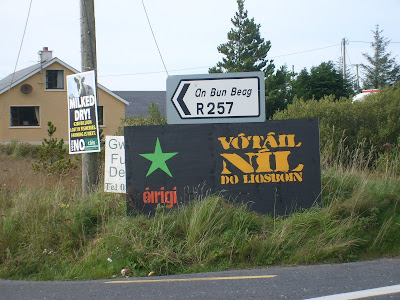Stormont Isn’t Working for the 100,000 Out of Work15/09/09
As Britain’s Stormont administration resumes this month, the impotency of its politicians in the face of the crisis in capitalism continues unabated.

Despite a recession affecting greater numbers of people than officially admitted, the Stormont parties collude to conceal both their own ineptitude and the full extent of that crisis from the population.
Numerous adjustments to the official definition of ‘unemployment’ were previously made by various British governments, which revised figures downwards by moving unemployed people on to other social welfare benefits – to class them as “economically inactive” rather than unemployed.
Today, Stormont’s politicians use the same methodology to mask the full extent of unemployment. They have learned well how to mimic Whitehall’s sleight-of-hand tricks.
The most recent employment figures for the North put the ‘official’ unemployment rate at 6.7 per cent or 51,000.
Buried among those official statistics was a shocking acceptance by the Six-County Department of Enterprise, Trade and Investment that among those classed as “economically inactive” are another 50,000 people who are seeking work.
Just as Stormont’s increasing budgetary deficit is hidden from view by private finance initiatives, 50,000 people were hidden from public view in official unemployment figures.
Add these 50,000 ‘lost’ people to the official unemployed figure and one discovers at least 101,000 men, women and young people seeking work in the Six Counties.
In real terms, unemployment is actually over 13.0% – a rate not seen since the early 1990s – putting the North’s unemployment levels above that of the Twenty-Six Counties (12.4 per cent) and the European Union (9.5 per cent) for August 2009.
However, no party or elected representative at Stormont is prepared to break ranks to challenge this cover-up.
To admit that unemployment is at such high levels would run counter to the ‘good news’ stories and artificially manufactured political deadlocks which Stormont prefers.
Some recent examples demonstrate just how scarce jobs have become in the Six Counties. One supermarket chain revealed in August that a staggering 3,500 people applied for 172 jobs at two new stores it had opened. Another stated that, since August last year, it had received over 9,000 applications for just 81 new jobs.
And it’s not just those of working age that the Stormont political class are failing.

Two years ago, Barnardo’s, in the It Doesn’t Happen Here report, showed that over 100,000 children and young people in the Six Counties were living in officially defined levels of poverty, with a further 44,000 children and young people living in severe poverty. That already shamefully high figure can only have increased due to rising unemployment and high food and fuel prices, leading to even more families struggling to cover the cost of basic household bills.
An Audit Office report in 2008 found that 34 per cent of homes in the Six Counties were experiencing fuel poverty. In 225,000 homes, 10 per cent or more of household income was spent on energy bills to maintain an acceptable level of temperature in the home. Since that report’s publication, the effects of the economic situation have undoubtedly drawn more households into the fuel poverty trap.
In July this year, Age Concern/Help the Aged published research showing that the numbers of elderly people living in poverty in the Six Counties was also under-estimated by Stormont.
One of the researchers, Professor Eileen Evason said: “The figures that the Department (of Social Development) relies on count Disability Living Allowance and Attendance Allowance as income but do not take account of the increased costs associated with living with a disability and as a result underestimates the number of people living in poverty, in particular single female pensioners.”
If official calculations included the costs associated with living with a disability, the number of pensioner households unable to make ends meet would increase from 24 per cent to 30 per cent. The number of single female pensioner households in poverty would rise from 33 per cent to 41 per cent.
In housing, 38,923 applicants are now on the waiting list for social housing, 20,481 of whom are in urgent housing need. Almost 9,000 families were also deemed to be homeless during the past year and required immediate assistance and support.
The truth is that the social and economic fabric of the Six-County state is in complete disarray and the Stormont assembly is unable to provide any meaningful or effective solutions.

Instead, it opened business with yet another conveniently created political mini-storm in a teacup while people on low incomes are being financially squeezed and increasing numbers of children, adults and older people are falling into poverty.
Similarly, no party in Stormont is prepared to confront the key issue of how much people earn when they are in work.
In the Six Counties, the well-off still retain the largest slice of the financial cake. Meanwhile, the lower paid, when not faced with pay cuts, struggle to survive with paltry pay rises to meet huge increases in household bills.
In 1990, the highest earners in the Six Counties received, on average, at least £300 per week more than the lowest paid workers. In 2007, when Stormont was restored, that gap had risen to £600 per week. And that does not include the continuing unfair wage differential between men and women.
All the Stormont parties are keen to hide the stark reality of these actual unemployment figures, poverty levels and the wages gap – not only for economic reasons but because of the political signals these figures send out – a message that the Six-County state is an impractical and ineffectual economic entity based upon a misguided philosophy that partition can be made to work.
Stormont never worked for working class communities in the past. It’s not working for them now.

Over 225,000 homes not able to provide adequate heating are proof that Stormont isn’t working.
Almost 150,000 children living in poverty are proof that Stormont isn’t working.
Tens of thousands of pensioners living in poverty are proof that Stormont isn’t working.
Almost 40,000 people seeking public housing are proof that Stormont isn’t working.
Over 100,000 people who want work but who can’t get jobs are proof that Stormont literally isn’t working for them.
Stormont’s economic agenda is designed in Britain and implemented without question or dissent by local politicians. As the British Labour government (and increasingly more likely, a new British Tory government) prepares to introduce widespread cuts across all public sector services, Stormont will dutifully follow suit through ‘modernisation agendas’, ‘health service streamlining’ and ‘investment incentives’.
The reality for people in the Six Counties will be a massive, negative impact on housing, employment, health and social services, with continued community disintegration and housing shortages, reduced services for the ill and vulnerable, and further financial pay offs to companies through the privatisation of public services with rock-bottom wages. Stormont won’t be able to provide any alternative.
The clear and increasingly obvious signal is that a new political, economic and social order is required right across Ireland to bring radical, meaningful and effective improvement to the lives of working class people. Stormont cannot deliver on that and therein lies its most fundamental flaw.


























